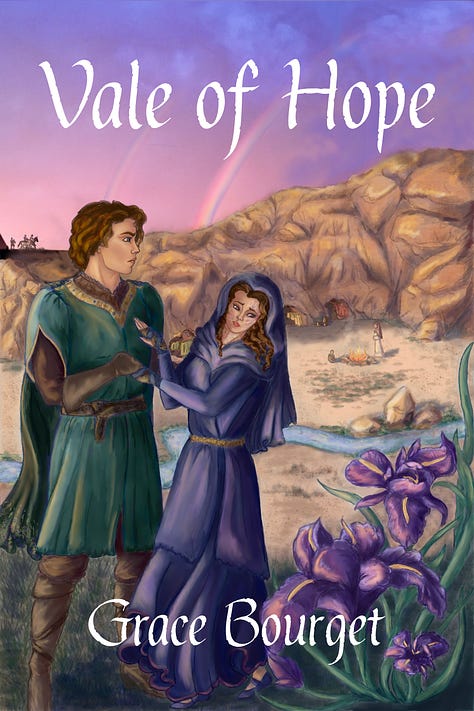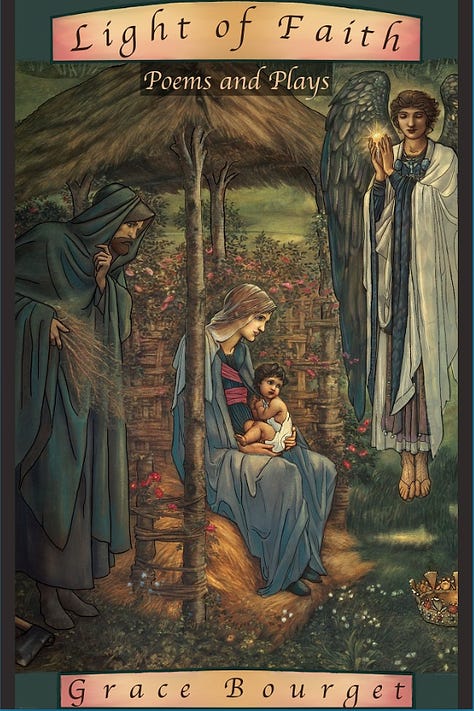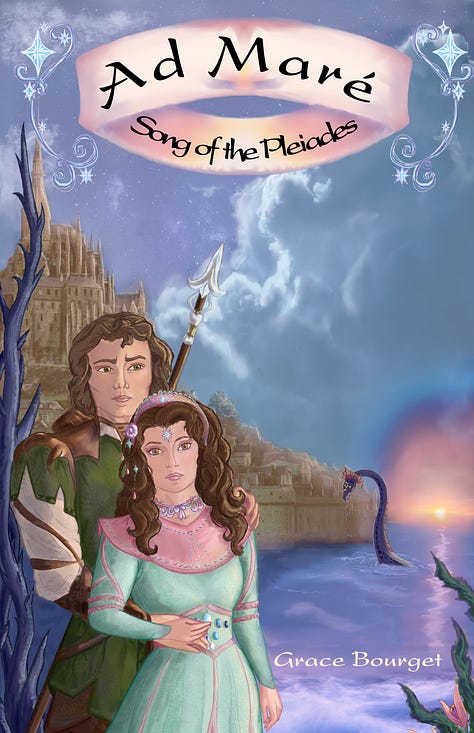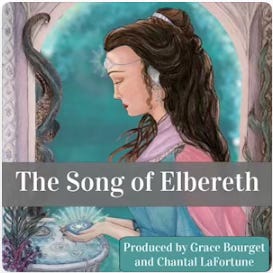
Due to time constraints, we forego our audio interview today in favor of text, as Chantal LaFortune interviews our mutual friend, Grace Bourget, a three-time authoress with En Route Books & Media. Enjoy! - T.J.
C.L. - Today I have the great honour of interviewing Grace Bourget, a three-time published author and the producer of an original radio drama. To begin, Grace, could you please tell us briefly about each of your books? What are their titles and what is each about?
G.B. - Vale of Hope was my first novel, a romance and conversion story set in Spain in the late 15th century. It centers on a rebellious teen who's given a penance of serving the members of a leper camp, only to unexpectedly find love: both human and divine, with the help of Our Lady of the Forsaken.
Light of Faith: Poems and Plays was my second book, a compilation of poems on spiritual themes, with the inclusion of two Christmas plays which were performed at our parish in 2018. One, which gives the book its title, regards a miracle due to the intercession of St. Lucy; the other, the creation of the first Nativity scene by St. Francis.
Ad Maré: Song of the Pleiades is my most recent publication, set in a fantasy realm threatened by an ancient curse.



C.L. - How does your Catholic Faith influence and inspire your writing ?
G.B. - Catholicism has majorly shaped what I write, as there was a huge, if somewhat gradual, change between the days before we went back to Mass - specifically attending the beautiful Latin Mass - and after. My mother homeschooled us, and at this time we started using the Seton curriculum, which was fairly grueling, but formative, particularly the Catechism and Bible study classes, not to mention Catholic history and English. Seton was wonderful for training me to write better! But in this conversion process, my intentions in writing changed, as well. I went from writing entirely something I wanted to write that had little true purpose in existing, save perhaps entertainment, to writing with God, the soul, and the Faith in mind. Now every story needs to have a purpose in order for me to write it; this helps eliminate the many other extraneous ideas I’ve had. Purpose can be, either I know a truth or a lesson I want to illustrate that is strong enough for me to write about - conversion from rebellion and apathy to love, conversion from despair to hope, as in the case of Paul in Vale of Hope, or the finding of purpose even in failure, as is the case for Pleia in Ad Maré - or I can tell that God is using the story and writing pieces of it, so even when I’m tempted to drop it, I have to keep going. I’ve also noticed the lack of good Catholic novels, particularly for young ladies, which aren’t strictly about a saint. This is a gap I’ve been hoping to help fill, because if it isn’t filled with wholesome, clean, pure, yet fascinating fiction, we’re left with all the non-Christian books, the non-Catholic books, many of which are still good, but there are far too many evil tales out there, especially in romance and fantasy. These are the genres I prefer to write in, because they’re in most need of some light.
C.L. - Why do you think fiction is worth the time and effort for both the author and readers?
G.B. - I’ve almost stopped writing a number of times, thinking that it wasn’t worth it, wanting to give up. I know some people think that fiction isn’t important, and we might get that impression even from most Catholic publishers. However, it can be much easier to draw morals and truth out of something as immersive as fiction tends to be, than out of a more factual book. I personally can’t generally get through any spiritual book, so I appreciate when a novel drives something home, putting it into practice through the characters in a way I can relate to and see played out. This is what I try to do in my own stories, perhaps helping drive something home to myself, and I hope that it will help others who need it, as well. Not to mention, J.R.R. Tolkien may be the most famous author of fiction, certainly of fantasy, and he was a devout Catholic. The same can be said of G.K. Chesterton; John Paul II wrote The Jeweler’s Shop. Christ Himself uses parables to illustrate divine truths! All of life is a story from someone’s point of view, and stories have been valued as a part of every culture for as long as man has existed.
C.L. - Could you please tell us more about your most recent novel, Ad Maré? What is it about?
G.B. - If I had to condense it into themes, ultimately it's a tale of finding and fulfilling one's God-given purpose, even if it feels like failure; that there may be only a single light when all else seems lost or contaminated by evil, but there still is light if you look for it.
The story follows Pleia, the Princess of the Temple in the kingdom of Celae, who is haunted by a vision from her childhood; Maia appeared to her and placed the mark of a star upon her brow, and ever since, Pleia has heard a strange call to follow the Pleiades. The chance finally comes when Celae is on the brink of collapse beneath the mere beginnings of an ancient curse, and with the help of the Temple Guardian, the warrior Eridan, and two exiled Guardians of the realm, she makes the journey, despite her fears that she's imagining her purpose and is only a burden to the others. Even those fears don't prepare her for what they face hidden within an ancient mist.
C. L. - Is there anything that particularly inspired you to write Ad Maré?
Ad Maré was originally intended to be a rewrite of The Song of Elbereth: A Middle-Earth Tale, a short story, and subsequently an audio drama, written as my final exam for Holy Apostles College and Seminary's class on C.S. Lewis and Tolkien. The Song of Elbereth was inspired by my curiosity as to how Galadriel could have obtained the light of the star Eärendil for Frodo, and was my attempt to offer a possible explanation, linking the gift to the Queen of the Valar, Elbereth, who created the stars.
C.L. - Could you please tells us more about The Song of Elbereth? What was the radio drama production process like?
G.B. - The Song of Elbereth followed the journey of an orphaned elven maiden, Earelda, the adopted daughter of Elrond. After having a vision of Elbereth in the palantir at Emyn Beraid, she is sent on a quest by Galadriel to obtain the light of the star, Eärendil, but her group encounters monsters and ancient sunken cities on the way.
The production process was lengthy. My original intention with the class had been to film a short play, or if that didn't work out, to have an audio drama. Neither happened, but when I submitted the story to my class in May of 2020 with a brief audio introduction in which I mentioned the idea of a future radio play, Dr. Sebastian Mahfood, who taught the class at the time, asked if I would be interested in creating the audio drama for WCAT radio. I believe we put the script together over late summer through the fall, and were pulling together a cast probably up through January. Everyone was spread out over the country, mostly college students as well as several high schoolers. As you remember, having such a large cast with only a handful in the same state, with most of the audio differing in quality, proved difficult. With all the schoolwork and other activities the cast was involved in, it took months to acquire all of the audio, and many, many grueling hours to edit and re-edit everything together in Audacity. Not to mention, the end result sounded different across different devices and speakers, so we would go back and forth trying to calibrate it, and eventually calibrated it for the sound of our computer speakers, which was the easiest to do. I had created a pronunciation guide for all the Elvish words and phrases, as well as the names, which may not have been fully accurate but would serve to unify pronunciation; but, we still had varying pronunciations, which ended up being amusing, so we left it in rather than tracking everyone down again. One thing we miss is having a blooper reel, because the auditions and some of the practice sessions were a lot of fun.
C.L. - Getting to work with you on the radio drama was such a wonderful experience. How is Ad Maré different from The Song of Elbereth? In what ways are they the same?
G.B. - While both stories center on a maiden with a quest involving the ocean and an ancient city, the premise is different - one is to obtain a gift, one is to find her ability to prevent a curse from being unleashed. The Song of Elbereth was as thoroughly Tolkienesque as I could write it, making the style and tone as similar to his own as I was able, and steeping the story as deeply in Tolkien's creation as I could. Characters, place names, the Elvish words and phrases, and most of the songs were all Tolkien - on the other hand, the plotline was original, and the four central characters - Earelda, her handmaiden Dinfea, the rangers Berindir and his sister Rhaeloth - were of my creation. Despite my original intention to make Ad Maré simply a Tolkien-free retelling of Elbereth, I only reused a couple of paragraphs and a handful of elements from the plotline. There's still a quest, a lost ancient city, monsters, and a Marian figure, for instance, but anything that was Tolkien was fully removed, the story is different, and I only reused a couple lines of dialogue and maybe two paragraphs of text from Elbereth. Now it's a tale of ghosts, sea monsters, lost history, and archangels.
To listen to The Song of Elbereth: A Middle-Earth Tale on your favorite podcast platform, follow one of these links:
Apple Podcasts - Audible - Deezer - JioSaavn - Spreaker - Spotify - Podcast Addict - Podbay
To purchase any of Grace’s books on Amazon, you can click the buttons below, or you can find them on Barnes & Noble and other websites:
Windflower is fully supported by its audience. Instead of buying me a coffee, you can leave a donation which will go towards the purchase of fabric for interactive projects, where you’ll be able to vote on what historical dress or film costume I’ll recreate! Donations also help to continue creating Windflower’s content and to support the local Latin Mass.
Please consider subscribing and sharing with your friends. Thank you, and God bless!






Wonderful interview. The creative writing process descriptions were fascinating to me as a non-writer. It helps me to appreciate the labor of love of your craft.